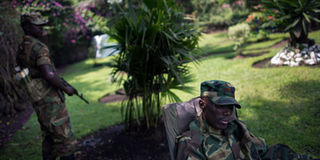Wreckage of war in DR Congo's Goma after rebel pullout

PHOTO | PHIL MOORE The head of the M23 rebel military forces, Brigadier-General Sultani Makenga (R), sits on November 25, 2012 in the yard of a military residence in Goma in the east of the Democratic Republic of the Congo.
GOMA, DR Congo
At a deserted army headquarters in the eastern Democratic Republic of Congo city of Goma, children fool around in heaps of soiled documents, packets of condoms and bullets.
The rebel M23 fighters who seized this key mining hub for almost two weeks pulled out on Saturday, but only few hundred police are now in the city of around a million people, the capital of this chronically volatile eastern region.
"There are mines and bombs and bullets," said Kenive Kalombo, 13, before picking up a rocket and waving it with a smile. "We came here to play with them."
The wreckage of war and the impact of conflict lies all around.
"It is very dangerous," said John Mwando, a secondary school teacher. "Since the M23 left on Saturday the place is not secured at all, and the children have just been free to come here."
Congo's army, who fled in disarray ahead of the lightning advance by M23 rebels, are said to be on their way with a battalion of some 600 men to enter Goma.
But as the tense city waits for their arrival, a few police in faded blue uniforms hesitantly monitor the uneasy calm, with gunmen outside the city attacking a camp for displaced people, looting and raping war-weary civilians.
Standing opposite the empty military courthouse, where marijuana bushes grow among a crop of straggly maize, Delphine Tchibalonza said she has not heard from her soldier husband since his unit fled the approaching rebels.
"I don't know where he is, I can't contact him on his telephone and I have no idea when he will be back," Tchibalonza said.
Next to her, Suzana Marte, the widow of a government soldier killed in a previous rebellion, said that she had just returned home after fleeing to another part of the town.
"Now that the M23 have gone we can go home. There is no security but despite it we have to come back," said Marte, who said she was in her sixties.
Close by, the government house of the commander of the North Kivu military region stands empty.
Used by M23 commanders while they controlled the town, inside nothing is left, except for an empty cupboard and bedframe.
"I was told to watch it but was too scared to come in," said neighbour Parti Munyator. "The general will return but I just don't know when."
At the military hospital, head doctor Patrick Mwanda says supplies of medicine and food are running low for the 59 people there who were injured in the fighting.
"The situation is always like this, but the war has made it worse," said Mwanda, a lieutenant in the national army.
Mwanda stayed behind when M23 took the town and says he treated the injured rebels alongside government soldiers, and was left alone to get on with his work.
"There were 12 of them (rebels) that were hurt, but they took them with them when they left," Mwanda said.




